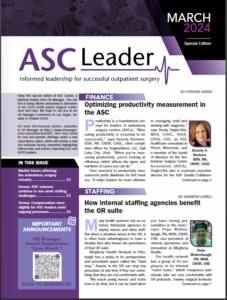
 Subscriber Content ASCs advised to embrace EHRs sooner rather than later
Subscriber Content ASCs advised to embrace EHRs sooner rather than later
Federal regulators have yet to mandate electronic health record (EHR) adoption at ambulatory surgery centers (ASCs). Many facilities remain content to use paper systems. However, one expert advocates preparing now for what may come in the future. Electronic documentation systems can help ASCs better achieve their clinical, financial, operational, and…
 Subscriber Content Implementing safety huddles to improve patient outcomes
Subscriber Content Implementing safety huddles to improve patient outcomes
The fast-paced environment in an ambulatory surgery center (ASC) requires meticulous handoffs, and daily huddles—brief (10 to 20 minute) stand-up meetings—can raise awareness of any potential safety issues. That has been the experience at UnityPoint Health in Des Moines, Iowa, and some of what we learned might help others improve…
Creative thinking shapes COVID-19 response to expected surge
The COVID-19 pandemic has created unprecedented strains on hospitals and healthcare systems, leaving many organizations with limited resources to care for severely ill patients. States, regions, hospitals, and health systems have had to reassess their resources, identify bottlenecks, and develop strategies for increasing critical care capacity. Creating the critical care…
 Subscriber Content Experts address COVID-19 concerns in AORN town halls
Subscriber Content Experts address COVID-19 concerns in AORN town halls
OR nurses are being asked to serve in positions outside the operating room and experiencing changes in their schedules, and they are concerned about the uncertainty surrounding the COVID-19 pandemic. To support OR nurses during this time of crisis, AORN has been holding town hall Q&A webinars with infection preventionists,…
 Subscriber Content Editorial
Subscriber Content Editorial
The impact of COVID-19 has been devastating, especially for those who have lost loved ones or income due to sudden unemployment. For healthcare workers and emergency services providers, fear of contracting the disease is now a daily part of life. The virus has commanded exclusive coverage in OR a.m. for…
 Subscriber Content Using algorithms to contain surgical smoke and aerosolized particulates
Subscriber Content Using algorithms to contain surgical smoke and aerosolized particulates
The hazards of surgical smoke are well documented. As far back as 2004, AORN began publishing guidelines to reduce exposure to surgical smoke and aerosolized particles during operative and invasive procedures. These guidelines can also be adopted to help protect COVID-19 patients and frontline healthcare staff who are exposed to…
Triaging OR capacity amid COVID-19: Lessons from the field
Health systems nationwide are examining policies and procedures related to their resources, staffing, and scheduling to prepare for anticipated patient surges due to COVID-19. In late March, I talked with perioperative physicians and administrators from two health systems with rapid increases in COVID-positive cases, which have prompted significant changes in…
 Subscriber Content Developing a COVID-19 Recovery Plan for surgical services
Subscriber Content Developing a COVID-19 Recovery Plan for surgical services
When the coronavirus pandemic begins to subside, hospital leaders will be sorting out the repercussions and trying to resume normal operations. The main impact on ORs has been the widespread cancellation of non-essential procedures. Case cancellations in March and April have reduced elective procedure volumes as much as 90%. Most…
 Subscriber Content Best practices back proactive antimicrobial stewardship in ASCs
Subscriber Content Best practices back proactive antimicrobial stewardship in ASCs
Hospitals have long dominated the realms of infection control and antibiotic overuse. Ambulatory surgery centers (ASCs), which typically release patients the same day of a procedure, use antibiotics less frequently than other facilities, and most do not have an antimicrobial stewardship program. However, some ASC leaders and organizations are encouraging…
 Subscriber Content How prepared is your ASC to handle a surgical emergency?
Subscriber Content How prepared is your ASC to handle a surgical emergency?
Surgical errors and emergencies can happen at any time, at any facility. For ambulatory surgery centers (ASCs), a major challenge is finding official guidance on the topic. For the most part, it’s up to the individual facility to craft its own policies, competencies, and drills for OR emergencies. “The Association…


